By Walcott Aganu
“Africa’s young emerging leadership is made up of people who have a passion and vision for the continent. Harnessed well, they will ensure each Africa country benefits from an array of human capital that can take the continent forward” Patrick Makokoro
Brookings Institute reports that 70 percent of sub-Saharan Africa’s population is under 30, representing about 743 million of the 1.061 billion people in this region. These statistics represent a robust workforce for the next several decades and a pool of future leaders, from local communities to the national level. Integration of young people into key strategic leadership roles is essential for sustainable economic development and Africa’s survival. When we talk about Africa’s future, experts often see the continent’s large growing population as an asset.
Although research has shown young people’s contributions to driving changes in political systems around them, they still face multiple forms of silent discrimination and limited opportunities to participate in formal and informal leadership roles in Africa. The challenge of youth incorporation into crucial strategic leadership roles in Africa has to do with the mistrust from leaders who refuse to charge young people with a responsibility to lead and be part of decision-making processes.
There is a lack of youth representation in key strategic positions in the continent. Africa is a youthful continent, and this can be the bedrock for economic growth. Failure to make advances in developing and capacitating young people to take up leadership roles is a woeful delay of the future the continent aspires to build.
There have been tendencies in the business, social and political arenas to reserve valuable young leaders for future leadership roles that may never come into existence. This is a culture that African leadership must dispel if the continent is to make a serious shift from a developmental state to a progressive socio-economic path. We must encourage a common and shared goal and allow young leaders to develop and advance effective models to find an African solution to Africa problems.
Although a long-term development framework, the African Union’s Agenda 2063 promises a positive future this cannot be guaranteed without young leaders taking full ownership of the framework. After all, they are the ones who will still be around to account for the success or failure of Agenda 2063.
And while the historic elections of young people such as Austria’s Sebastian Kurz, elected chancellor in 2017 at the age of 31, or El Salvador’s Nayib Bukele, 37 when he became president, make headlines elsewhere, it is troubling that this doesn’t occur on a continent where the median age is 19. It is worth noting that Africa does play host to young leaders, including 44-year-old Ethiopian Prime Minister Abiy Ahmed, though these are few and far between.
Disruption of youth participation can no longer be left unattended by policy makers, governments, and African leaderships of learning, religion and politics. Young people must sit on boards and cabinets. Today innovative youths aiming for positive change in Africa are the mastermind behind many initiatives that focus on economic empowerment and development of the region.
Current Trends
The idea that Africa’s youth bulge is the key to sustained economic growth—a so-called demographic dividend—is a popular talking point for ageing African leaders who coopt such language in an effort to signal faith and optimism in the next generation. This was particularly evident in 2017 when African heads of state adopted “Harnessing the Demographic Dividend through Investments in the Youth” as the year’s official theme for the African Union.
While gestures toward youth empowerment are welcome, one awkward fact stands out: Africa—the youngest continent in the world—plays host to some of the oldest and longest-serving political leaders.
This is not to say that nothing is happening anywhere. Notable actions and activities are already taking place:
- Countries like Kenya and Morocco have set quotas for youth representation in their national parliaments, and Botswana recently appointed a 31-year old young woman as the Minister of investment, trade and industry – all positive steps in the right direction that other African countries might emulate.
- The AU’s African Youth Decade Plan of Action recommends that African countries commit a fixed percentage of national budgets towards youth development. This is an important commitment, which requires a strong review mechanism at the regional level to guarantee that each member state respects it in practice.
- In Nigeria, #NotTooYoungToRun’s age-limit bill was signed into law on March 31, 2018, by Nigeria’s then 75-year-old president, Muhammadu Buhari. That campaign demonstrates the power of youth coalitions in helping redesign political systems to operate more inclusively and allow for greater participation of an overwhelmingly young population.
- Rwanda’s gender budgeting efforts might also teach some valuable lessons in this regard. Borrowing from the country’s example, a youth budgeting framework could be put in place with ministries and their departments encouraged to have specific goals for youth empowerment within a particular timeframe. As in Rwanda, this could be reinforced by a youth monitoring office that would be in charge of evaluating outcomes and hold ministries accountable for delivering on their youth-related objectives.
- A crucial part of Rwanda’s initiative has been engaging in civil society and the research community in providing feedback to the government on strengthening their programmes, which is where actors such as youth organizations might come in. If youth movements could get their act together and organize properly, they might be able to apply political pressure for similar processes.
Making a new generation of leaders in Africa
Africa has the world’s youngest population and its oldest leaders. If the next generation wants change, young Africans must abandon dreams of private-sector success and enter the political arena.
Current leaders have the responsibility to engage, cultivate and invest in Africa youths for active leadership. It’s binding upon the older generation to ensure that youths receive a quality education and practical skills and develop characters and a commitment to Africa’s shared future. According to the African Leadership Institute report, approximately 700,000 young Africans have already been exposed to some form of selective leadership initiative; thus, the challenge now is to tap into these pools of young leaders. In time, these young leaders will use their expertise and experiences to nurture the next generation.
This is a period of incredible innovations as young people are leading development in many parts of Africa. Technology has redefined how people communicate and connect globally. More than ever, there are tremendous opportunities for entrepreneurship and investment on the continent.
- Business and government must prioritize bringing young people to work: by restructuring labour market dynamics that often miss the opportunity to groom young people in rural areas, teaching them life skills beyond formal qualifications and entrusting them with leadership roles. Business, government and universities must establish partnerships tasked with identifying young people in and outside institutions of higher learning. Part of this task must involve research units that will facilitate the programmes by conducting needs assessments, planning, implementation, and evaluation. The initiative should enable and promote a climate of healthy youth development and excellence.
- National commitments and greater investments in youth initiatives should take priority. Policymakers and governments must accelerate leadership programs in government and other sectors. Each company should set up mechanisms to adopt a creative policy to develop young leaders who will drive the attainment of sustainable goals. This approach should enable healthy dialogue, draw in energetic young employees and encourage participation by young people.
- The strength demonstrated by dedicated young people should be recognized in our spaces. African leaders, politicians, and African partners must work with young people and welcome new ideas, especially as the world changes and technology continues to advance. Empowering young people and integrating them into key strategic leadership roles begins when the older people acknowledge the opportunities presented to us by youth participation, the transmission of knowledge, and trusting youth with achieving sustainable development goals. It is all possible, and it can be done with the right intentions at heart.
Of course, the buck stops with the leaders, and it is up to them to go beyond oratory and finally invest in their youth. But young people need to realize that they too have a responsibility. They must look beyond the exorbitant costs of running for public office, endemic corruption, and threats of violence and not be fooled by the false promise of becoming the next heropreneur; if they want to achieve political change, they will have to match their good intentions with a sound strategy—and ultimately enter the political arena.
When tomorrow comes, they will need to be well-armed with the right skills and experience to lead the continent forward and give shape to the Africa they want, as Agenda 2063 puts it. Looking ahead, one hopes that, when their time comes, the African youth will lead better than their predecessors and not succumb to political infighting and create the right opportunities for the next generations.


